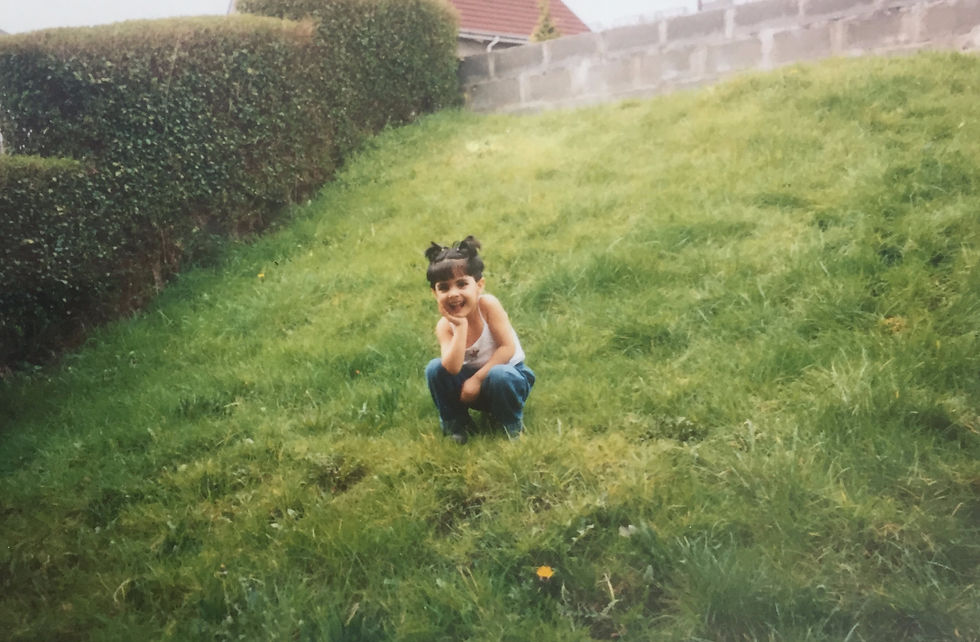Your inner child
- shamfare
- Dec 4, 2020
- 4 min read

This year has been a difficult one for a lot of us and a big reason why is because of the (much-needed) lockdowns. We were forced to spend time with ourselves and, speaking for myself here, I can confirm it was an intimate and daunting experience. During both lockdowns, I became more in touch with nature because of my daily walks with my dog - insert adorable picture below- and that's when my interest and journey with spirituality began.

Self-acceptance allows you to distinguish your qualities, both the bad ones and the good ones. This practice helps you ease your feelings of guilt and unhappiness. Through connecting with our inner-child, we can obtain new information about our unhealed wounds, and possibly the needs that we may not have had met when we were children. It is a very powerful psychological tools for those who have been through childhood trauma or self-destructive patterns, but also for anyone who wants to better themselves. Sometimes we are unkind to ourselves, I am very guilty of this, and it is necessary to nurture our inner child and give ourselves the time and patience we need to flourish.
So, what is this "inner child" I keep mentioning? Your inner child is the innocent part of you, it is made up of your primal needs. The child is vulnerable, deeply sensitive, curious, creative, full of emotion, craves love, validation and desires safety. The "outer child" is what's responsible for self-sabotage. It responds to the inner-child and can over-protect by acting out. Your outer child can cause uncalibrated levels of emotion, self-defeating behaviour, it fights change, and is impatient.
Your inner child can be wounded through psychological/emotional trauma or neglect. When this part of you is wounded you can fall into the trap of thinking you're broken, fearing abandonment, having low self-esteem or indulging in destructive behaviour. How our inner child was treated determines how we treat ourselves in the years to come. Once we establish a healthy dialogue between our inner child and our adult self we can identify our needs. We can clearly communicate our emotions, practice self-love and self-care and honour boundaries. Being able to recognise your bad qualities and reflect upon them is a form of shadow work.
Shadow is a psychological term that refers to everything we cannot see in ourselves. It's the "darker" side of our personality which is made up of negative emotions and impulses- like selfishness, envy greed and rage. Naturally, we go to great lengths to protect/hide our self-image from anything that is unflattering, making it easier to observe another's shadow before acknowledging our own. Our personal shadow is our "disowned self", it's the part of us that we do not claim or examine. These negative traits we repress don't go anywhere, even though we deny them in our attempt to cast them out we don't actually get rid of them.
The Greek gods were relatable to the ancient Greeks, they each had their own downfall. They were more similar to us mortals than they were to the omniscient God that most of us now worship. The Greek gods or goddesses understood the need to honour all of the parts of the psyche. The Greeks knew that a god or goddess you ignored was the one who turned against you and destroyed you. The same way any part we disown within us will turn against us. (I had to make a classics reference, apologies.)
So what happens when you repress your shadow? Very simply put, you begin to see it in other people. You begin to project. These psychological projections distort reality, creating a thick boundary between how we view ourselves and how we behave in reality.
"Unless we do conscious work on it, the shadow is almost always projected; that is, it is neatly laid on someone or something else so we do not have to take responsibility for it." - Robert Johnson
Exploring your own shadow can facilitate personal awakening and greater authenticity. This insightful (yet emotionally draining) process is essential for obtaining maturation.
I realise that I have thrown a lot of information at you and you may be feeling overwhelmed. So for the next part of the post I will be giving you some tips on shadow work, how to face your disowned traits and heal your inner child. Doing your own research is essential and definitely far more useful than whatever I am saying.
Shadow work exercises: - watch your emotional reactions ; the more you pay attention to your behaviour and emotions, the better chances you have of catching your shadow in the act
- question your thoughts, spend more time alone and learn how to communicate better
- engage in inner dialogue (between your inner and outer child)
- the 3-2-1 shadow process developed by integral philosopher Ken Wilber
- honestly, for me journalling has been the greatest of help, monitoring your emotions and your reactions
some books on it:
Owning Your Own Shadow: Understanding the Dark Side of the Psyche by Robert Johnson
Kings, Warriors, Magicians, Lovers: Rediscovering the Archetypes of the Mature Masculine by Robert Moore and Douglas Gillette
Meet the Shadow: The Hidden Power of the Dark Side of Human Nature edited by Connie Zweig and Jeremiah Abrams
How to connect to your inner child:
- form a dialogue with yourself as a child, ask questions such as "what do you need right now?"
- make art that reflects your inner child
-revisit joy
- write a letter to your inner child
Lastly, I want to add that this is a process and I admittedly haven't completed any of the things I'm preaching about. It's okay to be a work-in-progress. I hope that you stay kind to yourself and treat yourself with compassion in these trying times.
- sham






Comments